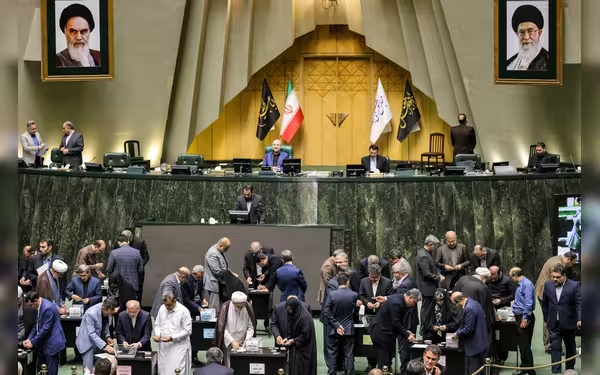Saturday, November 16, 2024 07:27 PM
Iran's Internal Debate Influences Israel Standoff
- Khamenei navigates complex internal political dynamics.
- Iran's factions debate military aggression versus diplomacy.
- Hezbollah's role crucial in Iran's regional strategy.
 Image Credits: arabnewspk
Image Credits: arabnewspkIran's internal debate shapes its response to Israel, with Khamenei balancing military and diplomatic pressures amid rising tensions.
In recent times, the internal dynamics of Iran have become increasingly significant in shaping the nation’s response to its ongoing stand-off with Israel. As tensions escalate, the debate among various factions within Iran is crucial in determining whether the situation will lead to further conflict or a potential resolution. At the heart of this discussion is Ayatollah Ali Khamenei, Iran’s supreme leader, who, despite being the ultimate authority, must navigate a complex web of competing interests and opinions.
Experts highlight that while Khamenei holds the final say, he is not alone in this decision-making process. Beneath him, different groups within the Iranian political landscape are vying for influence. Some members advocate for negotiation and diplomacy, while others push for a more aggressive military stance. This internal debate is particularly important as Iran faces setbacks and confrontations with Israel, which has been described as the Islamic Republic’s sworn enemy.
In a recent public sermon, Khamenei made it clear that Iran’s militant allies, including Hamas and Hezbollah, would not “back down” in their fight against Israel. He ominously stated that Israel “does not have long to live.” This rhetoric underscores the seriousness of the situation and the potential for escalation. However, the newly-elected reformist President Masoud Pezeshkian has also signaled a willingness to engage with the West, suggesting a revival of the 2015 nuclear deal that was abandoned in 2018.
As Israel prepares to respond to Iran’s missile attack on October 1, Khamenei appears to be walking a tightrope. He is keen to avoid an all-out war while demonstrating that Iran can stand firm against its adversaries. The supreme leader, who has been in power since 1989, is known for his cautious approach, often taking time to weigh the opinions of various factions before making a decision.
According to analysts, the decision-making process in Iran is akin to a chess game, where every possible move is considered before a final play is made. The Islamic Revolutionary Guard Corps (IRGC) plays a pivotal role in this dynamic, maintaining connections with Iran’s regional allies and influencing foreign policy. The president, while a significant figure, often has limited power in shaping these critical decisions.
Despite the authoritarian nature of the Iranian regime, there exists a history of internal disagreements regarding foreign policy. This complexity is further illustrated by the reactions to recent events, such as the assassination of Hamas leader Ismail Haniyeh and Hezbollah leader Hassan Nasrallah. Khamenei’s responses to these incidents reflect the shifting opinions within the Iranian leadership, showcasing how positions can change rapidly based on current events.
As the situation evolves, the role of Hezbollah cannot be overlooked. Considered Iran’s most valuable ally, Hezbollah possesses a significant arsenal and is seen as a crucial asset in Iran’s regional strategy. Some experts even suggest that Hezbollah’s long-range missiles serve to protect Iran’s nuclear facilities, acting as a defensive shield.
Looking ahead, Iran’s strategy will likely be influenced by a combination of regional dynamics, international pressures, and internal factional disputes. The radical wing of Iran’s leadership has been successful in convincing Khamenei that restoring Iran’s credibility is essential, especially following setbacks abroad. This internal debate will continue to shape Iran’s actions and responses in the coming months and years.
The internal debate within Iran is not just a matter of political maneuvering; it has real implications for regional stability and international relations. As various factions vie for influence, the decisions made in Tehran will resonate far beyond its borders, potentially affecting the balance of power in the Middle East. Understanding these dynamics is crucial for anyone looking to grasp the complexities of Iran’s position in the ongoing conflict with Israel.













